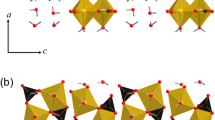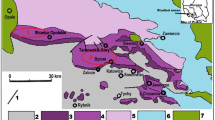Abstract
IT is well known that members of the montmorillonite group may be classified into a number of subgroups which differ in isomorphous substitution, having varying proportions of different cations1. Theoretically, a continuous substitution is possible. But although a wide range of substitution is known in clay minerals, a continuous series has not yet been found.
This is a preview of subscription content, access via your institution
Access options
Subscribe to this journal
Receive 51 print issues and online access
$199.00 per year
only $3.90 per issue
Buy this article
- Purchase on Springer Link
- Instant access to full article PDF
Prices may be subject to local taxes which are calculated during checkout
Similar content being viewed by others
References
Ross, C. S., and Hendricks, S. B., U.S. Geol. Survey Prof. Paper No. 205-B (1946).
MacEwan, D. M. C., J. Soc. Chem. Indust., 65, 299 (1946).
Berkelhamer, L. H., U.S. Bur. Mines, R.I. No. 667, 38 (1945).
Kerr, P. F., Kulp, J. L., and Hamilton, P. K., Amer. Pet. Inst. Perlim. Rep. No. 3 (1949).
Author information
Authors and Affiliations
Rights and permissions
About this article
Cite this article
BOSE, A., SENGUPTA, P. X-Ray and Differential Thermal Studies of some Indian Montmorillonites. Nature 174, 40–41 (1954). https://doi.org/10.1038/174040a0
Issue Date:
DOI: https://doi.org/10.1038/174040a0
This article is cited by
-
Contribution of Satyendra Nath Bose in chemical sciences and related disciplines
Indian Journal of History of Science (2022)
-
Interpretation of Differential Thermal Curves of Mixed-layer Minerals of Illite and Montmorillonite
Nature (1955)
Comments
By submitting a comment you agree to abide by our Terms and Community Guidelines. If you find something abusive or that does not comply with our terms or guidelines please flag it as inappropriate.



